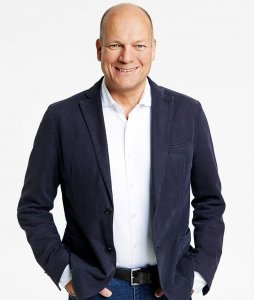You both worked as managers in the fashion business for many years and are now exclusively on advisory and supervisory boards. Is that fulfilling from a doer’s perspective?
Fichtel: On the advisory board side, it’s all about advising and strategically developing companies. From my point of view, that’s very exciting! You get to know different companies and can help them develop further. The big advantage is that you no longer have any operational stress, you’re no longer in daily business, but you’re still close to it.
As an advisory board member, your influence is limited. I could imagine that there are also frustrating situations?
Gedat: Sure. First of all, I agree with Armin. It’s fun to be able to pass on your knowledge. Of course, in the end, the owner has to decide what to implement. I see it more as a privilege to no longer have to do that. Of course, on the other hand, there are always situations where you suggest things out of conviction, and then the entrepreneur doesn’t do it. You just have to be able to put your own vanity completely aside. As a manager, you are used to being in front, and your whole environment does a lot for your vanity. That doesn’t matter as an advisory board member.
Medium-sized entrepreneurs in particular, who are used to make decisions on their own, will sometimes find it difficult to follow advice or even statutory decisions made by an advisory board.

Fichtel: After all, these entrepreneurs approached us because they wanted someone who could accompany them. Both of us have also managed companies. We can stand by an entrepreneur at equal eye level. But we can only give advice. If he decides otherwise, it is also his responsibility.
As managing directors, you also had to deal with advisory boards. At Marc O’Polo, at S.Oliver. What was your experience there? There must have been situations where you saw things differently than your advisory boards.
Armin Fichtel was CEO of the S.Oliver Group until 2017. Today, he is a member of the Supervisory Board of Ahlers AG, an Advisory Board member of Fynch Hatton, Chairman of the Advisory Board of Mustang (where he also holds an entrepreneurial stake), Chairman of the Advisory Board of Van Laack, and Advisor of the Supervisory Board at Wolford.
Fichtel: At the S.Oliver Group, I dealt with Bernd Freier on a daily basis. There was little else to talk about in the advisory board meeting than in daily business. At Basler, it was private equity people who had little operational involvement. As an advisory board member, I am now more involved in strategy and operations than I used to be as a manager on my own advisory boards.
Gedat: That was a little different for me. The supervisory board meetings at Marc O’Polo were indeed often not nice. That’s why I resolved to do it differently. To do it better.
What wasn’t nice about that?
Gedat: Let me put it this way: The supervisory board and the management board need a common idea of how a company should be developed. That doesn’t have to be without conflict. If you have different opinions and discuss them openly, something good usually comes out of it.
Do companies need an advisory board? Or rather: Which companies need an advisory board?
Fichtel: I think it’s good for every company to have external advice. And independent advice, without any power interests.
Gedat: The higher up you go, the fewer people you have who will freely give you their opinion. Unfortunately, I have also experienced in the past that advisory boards did not have their own opinion. This means that the essential potential of such a body remains unused. As an entrepreneur, you buy a lot of know-how for relatively little money with an advisory board.
Fichtel: And network. Matthias Eckert, for example, came to Fynch Hatton through us as the new CEO. That didn’t cost the company anything extra. Using a headhunter would have been more expensive.
Is it sufficient if an advisory board only provides advice? What responsibility and decision-making authority should an advisory board be given?
Gedat: In stock corporations, the activity also has a legal dimension. It may also make sense in the case of advisory boards in some situations, such as the regulation of a company succession, to also give the board decision-making powers. Otherwise, I am basically in favor of voluntariness. Today, I no longer need a position of power. That may have been different in the past. In the end, we all want to make a difference together.
What risks does an advisory board bear?

Gedat: With an AG, there is of course the Stock Corporation Act with all its regulations on liability. And of course there are also compliance guidelines. You have to face up to this responsibility. That’s also one reason why I don’t want to work as a management consultant. They can say whatever they want, because in the end they have no responsibility. I also never want to have to take out D&O insurance. I want to do a decent job and look in the mirror every morning. After all, I do of course feel I have a duty to the entrepreneurs and shareholders.
What is the maximum length of time that advisory board members should be in office?
Gedat: Every company has its cycles. I would make that dependent on the phase of the company’s development. In a growth phase, you need strategists. When it comes to restructuring, you need restructurers. I think it’s smart for an entrepreneur to choose an advisory board that could also take over his job if something should happen to him.
If we’ve observed correctly, you weren’t in the running for the Gerry Weber CEO position.
Gedat: No. And I hope I won’t have to take on a role like that again any time soon. But the general rule is: If you say A, you have to say B. In the case of Gerry Weber, I felt responsible, and the other Supervisory Board members saw it the same way, and that’s how I did it.
Fichtel: At Fynch Hatton, the security argument was also a key reason why Roger Brandts gave us more powers than usual on the advisory board. I think that’s entrepreneurial foresight. After all, something can happen any day.
You both sit on several advisory boards, at Ahlers and Fynch-Hatton even jointly. Good for you. Can’t there be conflicts of interest?
Fichtel: That was discussed at the beginning. But it turned out to be no problem.
Gedat: Every company has different values, visions and goals. Companies can expect us to fully adapt to the situation at hand. Armin and I are driven by intrinsic motivation. Of course, we get money for our work. But that’s not the driver. It’s about passing on knowledge and making a difference.
You also have an insight into the respective figures, which can be problematic with companies like Fynch Hatton and Ahlers, both of which are active in menswear.
Gedat: With Ahlers as a listed AG, the figures are all public anyway.
Fichtel: The companies can also benefit from each other. For example, there is direct competition between Mustang and Pioneer from Ahlers. Normally, there would be no communication, but this is a good way to exchange experiences.
What is the ideal composition of an advisory board? What role does diversity play?
Gedat: The main thing is diversity! Another Armin, another Alex – what’s the point? I think an advisory board or supervisory board should reflect as many aspects of the business as possible. Armin comes from a retail background and knows a lot about the product. My background is in controlling. We have different strengths, and we’ve seen different companies from the inside.
Do we need more women on supervisory boards?
Gedat: The majority of people working in fashion companies are women. At Marc O’Polo, it’s two-thirds. So it’s important that this is reflected on the boards.
DAX companies now have a quota. How open are SMEs to the issue?
Gedat: They often find it difficult. Unfortunately, there is still this old boys’ network. You’re addressing a sore point here.
We at SUITS. Executive Search are increasingly being asked about women.
Gedat: I think that’s good. If you don’t have your own network, you have to call on external support.
Fichtel: Unfortunately, there are still not that many women who have experience in corporate management. That will certainly change in the future. At the S.Oliver Group, I had as many female managing directors as male managing directors.
Gedat: And on the advisory board?
Fichtel: There was only Bernd Freier’s daughter, Kathrin.
But gender will not have been the criterion for filling management roles.
Fichtel: No. It was a matter of competence.
Gedat: Diversity, different perspectives are good. What I find central, by the way, is internationality. We are all familiar with the German market, but the major growth is taking place beyond the borders.
Fichtel: A modern advisory board certainly also needs digital expertise. Of course, neither of us is. We know the strategic importance of this topic, but we don’t have the implementation experience.
What expertise does one need to be an advisory board or supervisory board member? What qualifies a person to take on such a position?
Fichtel: You can’t be a know-it-all, but you have to get involved in your advisory role. Of course, independence and the attitude that you don’t have to prove anything to yourself help.
Gedat: You shouldn’t be opportunistic, but stand by your own opinion. Have backbone. Not stubborn, of course, but combined with empathy and sensitivity. That gives you a higher level of acceptance.
Fichtel: And, of course, it’s about putting the company and its success first, and not your own personal interests.
If you take a look at your work on the various advisory boards: What topics are on the agenda for 2022? Certainly, each situation is different. But are there commonalities? Major topics?
Gedat: Of course, digitization presents companies with massive challenges. All the mates of us older ones, they’re stationary people. And the ones who are coming along now, they’re nerds with whom you can’t even talk about the collection. Because they’re not interested at all.
The other day, a successful start-up entrepreneur who was on the advisory board of a major fashion retailer told me, annoyed, about his withdrawal from this board. “They don’t even understand what I’m talking about.”
Fichtel: Of course, something like this has to be accompanied, and the owner or owners have to fully get behind it and get involved.
Gedat: Maybe it’s also the case that we sometimes have more empathy and patience because of our age and life experience. When a young e-commerce person comes along and says, “You have to do it this way, otherwise it won’t work,” he quickly wonders why that doesn’t always happen. We are not surprised!
Fichtel: About nothing anymore (laughs)!
Gedat: We are laughing now. But I’m actually serious. Perhaps it’s easier for us to put ourselves in their shoes and try a second, a third, a fourth time to inspire the entrepreneurs to do what’s right. We were once in a similar situation ourselves. As managers, we certainly did a lot of things right. But we didn’t do everything right, and we didn’t always listen carefully. We can pass on this experience.
Doesn’t it sometimes tempt you to become operational again? If you were offered a top position, would you listen to it?
Fichtel: Probably not.
Gedat: So fashion, I don’t listen to that anymore, not even on an interim basis. But if it was a brewery or a winery, that would be different (laughs). I’m not the fashion type at all.
Fichtel: I hadn’t noticed that at all, Alex (laughs).
Gedat: It’s certainly different for you. I’m even red-green blind. I could rather imagine investments or an entrepreneurial activity.
Fichtel: Ditto.
And what about other advisory or supervisory board mandates? Five or seven are quite a few…
Fichtel: In terms of time, that would be possible. As long as it’s an interesting role.
Gedat: It’s a little different for me. The chairmanships of the supervisory boards of Ahlers and Gerry Weber as listed companies require quite a bit of commitment. I’m in regular demand there and spend one or two days on site every month. Another role like that would also contradict the Corporate Government Code. I would be attracted by an international role, for example in Italy, where I once lived for four years. That would be fun for me.
Mandates Armin Fichtel:
– Supervisory Board Ahlers
– Advisory Board Fynch Hatton
– Chairman of the advisory board Mustang
– Chairman of the Advisory Board Van Laack
– Advisor of the Supervisory Board Wolford
Mandates Alexander Gedat:
– Chairman of the Supervisory Board Ahlers
– Chairman of the Supervisory Board Gerry Weber
– Advisory Board Fynch Hatton
– Advisory Board Sportalm
– Supervisory Board Controller Akademie
– Supervisory Board Nymphenburg Group
– Advisory Board Yoona Ventures








